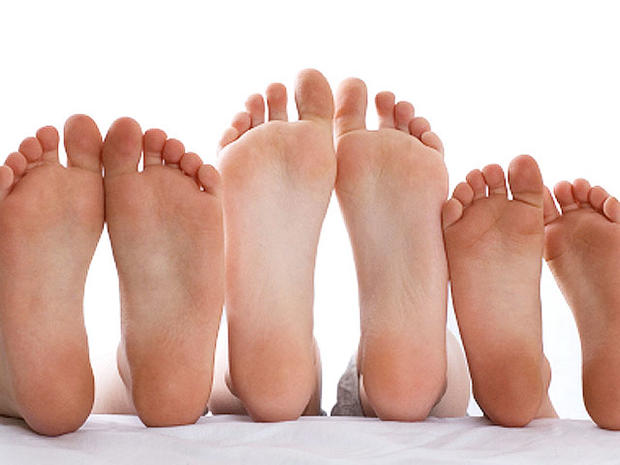Lack of arch support in flip-flops may lead to foot problems, experts say
(CBS News) Flip-flops may be a fun summer shoe and flats may seem fashionable, but some experts say wearing them may become a painful decision.
According to the National Foot Health Assessment 2012, 78 percent of adults ages 21 and over have had at least one foot problem in their lives, with ankle sprains topping the list. Blisters, calluses, foot fatigue, cracked skin and Athlete's foot follow as reasons why feet give many people problems.
Wearing flip-flops, flats and other shoes that don't provide arch support may contribute to your toe troubles. In the case of flip-flops, not only do the thin rubber soles give your feet zero arch support, your ankle is free to move about. This leads to twisted ankles especially for those who wear flip-flops with a slightly higher heel, according to Dr. David S. Levine, foot and ankle surgeon at the Hospital for Special Surgery in New York.
"If that foot is unbalanced or has a pronated or lower arch, that's a foot that is begging for support. It is begging for that person not to gain weight. It's begging for that person to keep their Achilles tendon stretched," he explained to HealthPop.
It's not that shoes without arches are bad for everyone. Levine said that if a person has a well-balanced foot, meaning their arch is not to high or too low, there's no problem with wearing flip-flops. And, if you restrict your wear to when you're doing low-impact activities, you shouldn't have that many foot problems. Walking or hanging out with friends is fine, Levine said, but don't try to wear your flip-flops when you're playing tennis.
Problems may occur when people have too-high of an arch or - in most cases - a low-lying arch. If a person has an unbalanced foot to begin with, arch problems can occur even more often, whether they are wearing flip-flops, ballet flats or other types of unsupported footwear. Foot fatigue is inevitable, and especially if you are overweight. According to the National Foot Health Assessment 2012, very overweight people were more likely to rate their foot health as fair or poor, were more likely to be experiencing a foot issue and a foot issue that caused a high level of pain.
"There's a natural tendency for an arch to settle over time as we become heavier, older and a little less capable of repair," Levine said. "Our Achilles tendon tends to give way to supporting an arch."
Wearing shoes that constantly rub against the foot may also lead to blistering and fungal infections, Levine said.
While some people can't avoid foot problems - even people who don't wear shoes get bunions, which shows some health concerns are hereditary, Levine points out - what type of footwear we decide to put on makes a difference. If you want to show off your toes, aim for sandals with arch support like Teva-brand shoes. And, for proper arch support and to keep your feet happy, don't be afraid to wear some sneakers, Levine reminds.
"If you wear a good pair of lightweight Nike shoes that has laces, you'll notice 'There's a little bounce and pep in my step,'" he assured.

